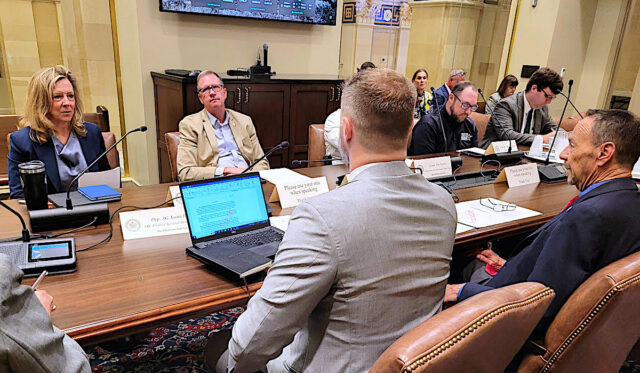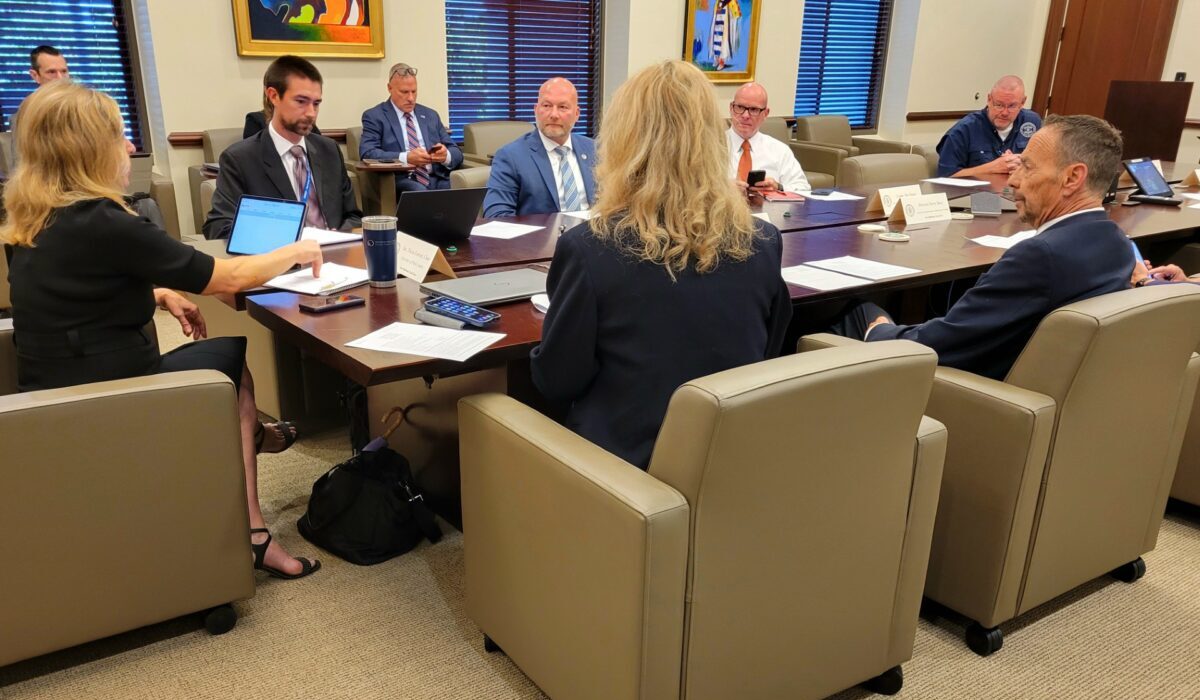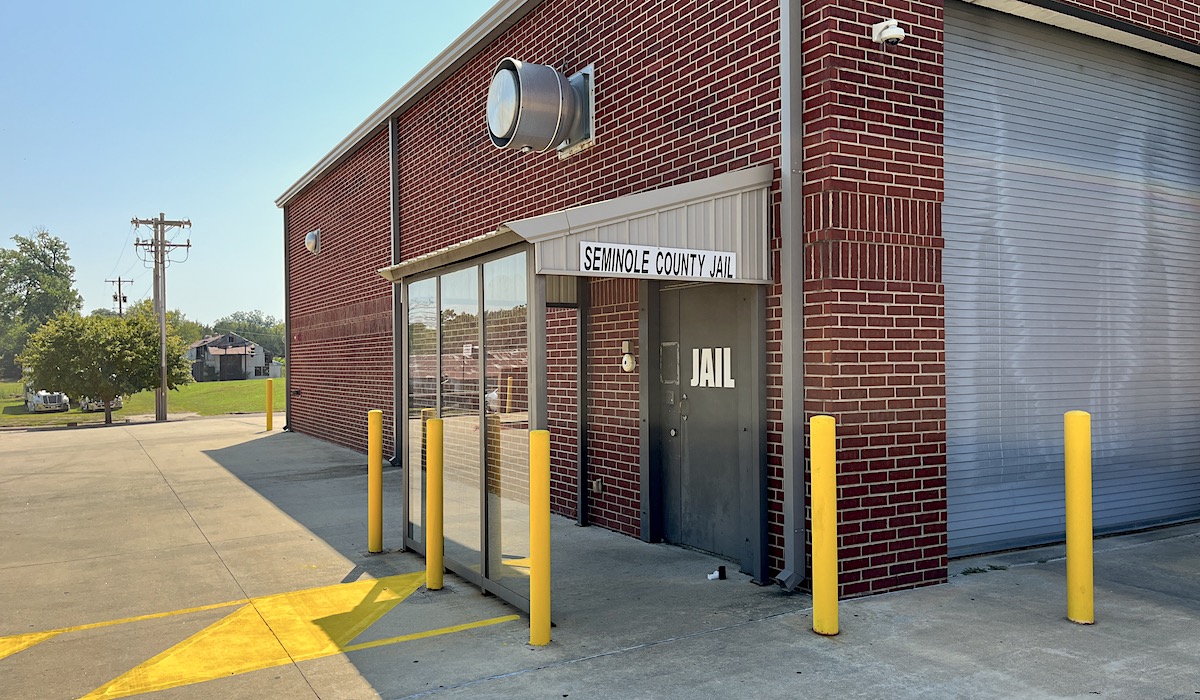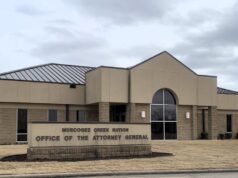

A task force aimed at improving law enforcement cooperation in eastern Oklahoma has recommended negotiations among state, tribal and federal governments to modify cross-deputization agreements, as well as additional training for local officers, new data-sharing arrangements and an interim study for legislators to “review relevant laws for updates as appropriate.”
Gov. Kevin Stitt formed the task force in December to examine cross-deputation agreements between local, state and tribal agencies, discuss the potential for uniform county jail agreements, and recommend proposals for state and federal legislation about other issues stemming from the U.S. Supreme Court’s McGirt v Oklahoma ruling.
Facing a Saturday deadline, the 13-member task force — established with two spots for tribal members, one from Oklahoma’s Five Tribes and the other from one of the state’s 33 other tribes — submitted its final report Wednesday to Stitt’s office, legislative leaders and tribal leaders.
In the report (embedded below), task force members said the Council on Law Enforcement and Education Training should develop curriculum to train officers for in-field decisions involving tribal citizens and crimes in Indian Country. Among the nine recommendations is for all law enforcement agencies in Oklahoma to “evaluate and adopt data-sharing agreements and require future information technology services to interface with each other in order to ensure public safety and the safety of law enforcement officers in the field.”
No official tribal representative took part in the task force’s five meetings, although some tribal attorneys and executives spoke with task force members throughout the process, which began in January.
Secretary of Public Safety Tricia Everest, who chaired the task force, said that despite tribal nations declining to Stitt’s two offered seats, the task force stimulated conversation on crucial topics between tribes and state and local officials.
“I recognize that this was an opportunity to prioritize what we need to do and that, because of this prioritization, the tribes and those agencies will work it out,” Everest said after the penultimate task force meeting May 13. “So, it’s not (that the) One Oklahoma Task Force was going to solve everything. But because it was created, it brought the discussions to the groups that need to actually work out the sub-agreements.”
Everest said the One Oklahoma Task Force “has helped to bring people to the table (…) to improve public safety for all agencies — tribal, municipal, state — and for the public.”
Stitt formed the task force in December, and it met five times between Jan. 29 and May 20. While tribal leaders elected not to participate directly, several task force members solicited and received input from tribal representatives, according to the report.
During its meetings, the task force discussed the possibility of replacing the existing overarching deputation agreement — signed among the state, tribes and the U.S. Bureau of Indian Affairs — from 2005.
However, the report states that some tribes expressed to task force members “a great reluctance” to entertain major revisions to the existing deputation agreements, in part because of their belief the U.S. Bureau of Indian Affairs would be disinclined to authorize a new agreement. But the report also references “an understanding” among stakeholders that the historic deputation agreements fail to address “the full complement of needs facing the state, county, municipal, and tribal agencies” after the eastern half of Oklahoma was affirmed as a series of Indian Country reservations following the July 2020 McGirt ruling.
Issued after a literal fight at the Okmulgee County Jail between state and tribal officers, Stitt’s order said the McGirt decision created “havoc” in the state and claimed “it is clear that the McGirt decision’s negative effects are unresolved.”
In a joint statement, leaders of the Five Tribes said in January they would not participate in the task force because they disagreed with how Stitt’s order characterized the McGirt decision, which they view as a positive public safety ruling that restored tribes’ ability to prosecute tribal citizens in Indian Country.
‘Eye-opening, educational and a step in the right direction’

With tribal leaders declining to participate in the One Oklahoma Task Force, Rep. Ken Luttrell (R-Ponca City) became a key liaison between the group of law enforcement leaders and tribal nations. A citizen of the Cherokee Nation, Luttrell was appointed to the task force by House Speaker Charles McCall (R-Atoka).
“I think this has been eye-opening, educational, and a step in the right direction to have open dialogue and seek solutions,” Luttrell said.
Instead of reworking existing agreements between tribes and county sheriff departments or municipal police forces, the task force recommended the negotiation of “addenda to the deputation agreement(s) to address additional topics of mutual interest.”
“I think we’re going take the recommendations from here and have some open discussion on whether we need to do something statutorily, or just get an agreement drafted on cross-deputization that’s more uniform,” Luttrell said after the May 13 meeting “And I understand it’s different on the jailing-people part in those agreements than it is in cross-deputization.”
Luttrell said parties “need to end up with some clarification and something that’s more uniform.”
“Certainly, I want to see the tribes more involved in that discussion of what they would like to see, what would make it easy for them and have something in statute that does away with the personality conflicts in some areas between cities and the tribes,” Luttrell said.
The long-time legislator, who is seeking his final term in November, said he and the Senate’s task force designee, Sen. Jessica Garvin (R-Duncan), are looking to hold an interim study to examine the situation further. In that setting, Luttrell said he hoped tribal officials would be at the table.
“You know, a lot of the tribes have said, ‘We still want our own ability to have individual compacts,’ so I think that’s something we’ll work out during an interim study with Senator Garvin and I when we put that together,” Luttrell said. “We certainly want the tribes to know that we value their input and want them to have a voice even though they weren’t in this room.”
Luttrell, who is chairman of the Legislature’s Native American Caucus, said Stitt’s stormy relationship with sovereign tribal nations made it awkward for their leaders to participate with the task force.
“It didn’t surprise me with the relationship between Governor Stitt and the tribes that some of them felt that they weren’t really included, even though they were invited,” he said.
Luttrell said he talked with various tribal leaders throughout the task force’s term to keep them informed of the conversation.
“They’ve been curious what kind of progress we’re making, and there’s always that hesitancy in the back of their mind that we could make things worse,” he said. “But there have been communications outside.”
Oklahoma Department of Public Safety Commissioner Tim Tipton, a task force member, said he hopes that when tribal leaders read the task force recommendations they realize members’ were objective and open-minded.
“I feel like everybody who sat on the task force had an open mind to, let’s figure out how to make this work the best, and that it wasn’t a predetermined outcome or anything like that,” he said. “So, yeah, I would have wished for them to have sat with us, but hopefully the interim study, they’ll come to that.”
Everest agreed.
“Tribal representatives were always welcome and nothing’s ever going to be accomplished without working with them,” she said.
County jail agreements among task force recommendations

Among other conversations, the task force looked at developing a model jail compact for housing tribal detainees, but members opted instead to come up with a template or a general guideline.
“If our county jails are going to contract with the tribes to hold their inmates, one universal agreement isn’t probably going to work because each county jail has different expenses,” Cherokee County Sheriff Jason Chennault said during the task force’s May 13 meeting.
The fairness of jail rates has been an issue for years. Questions have swirled not just around rates that tribes and cities pay to hold their detainees in county jails, but also how much the state reimburses counties.
The Oklahoma Supreme Court ruled in October that the Oklahoma Department of Corrections, which has been paying counties $27 a day per inmate awaiting transfer to state custody, must reimburse county jails for both consumable costs, such as food and clothing, as well as operating expenses incurred as a direct result of holding the inmates.
However, questions remain about how “direct” costs are supposed to be calculated in terms of the broader expenses that come with running a jail. Members of the Senate Appropriations and Budget Committee briefly discussed the matter in a meeting earlier this month and hinted at a desire for further conversations.
Currently, counties certify their own per-detainee daily rates, but detention contracts — which can contain minimum monthly thresholds — are not required to be standardized with cities, tribes or other entities. Some county officials have worried about whether contracts with tribes carry enough liability protections, and the process of establishing new contracts — such as Pontotoc County’s 2023 agreement with the Chickasaw nation — has featuring growing pains.
Still, despite lingering tensions among some tribal and local law enforcement communities, other opportunities are being eyed as well. With the troubled subterranean jail closed in Hughes County — which spans the Muscogee Nation and the Choctaw Nation — officials have discussed a potential county-tribal partnership to finance a new detention facility.




















